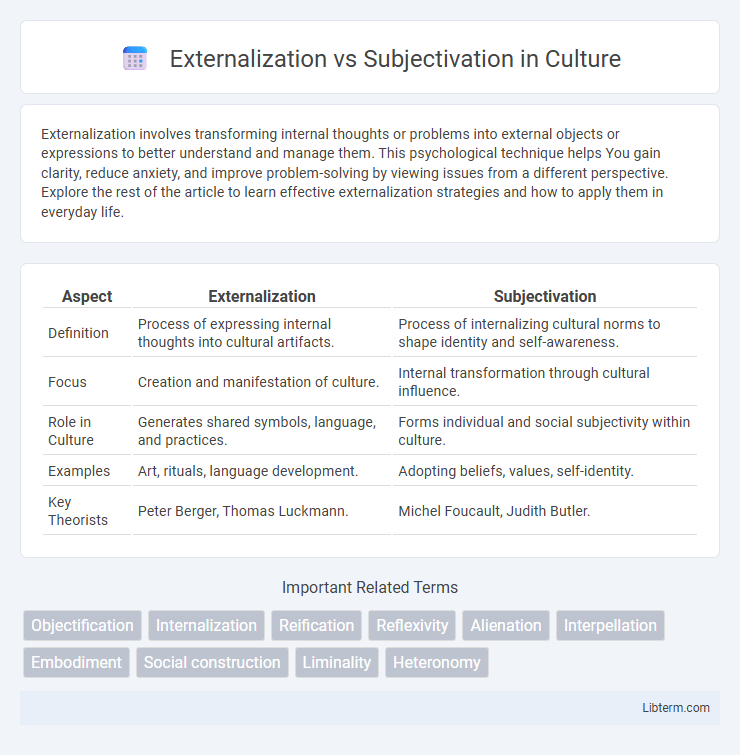Externalization involves transforming internal thoughts or problems into external objects or expressions to better understand and manage them. This psychological technique helps You gain clarity, reduce anxiety, and improve problem-solving by viewing issues from a different perspective. Explore the rest of the article to learn effective externalization strategies and how to apply them in everyday life.
Table of Comparison
| Aspect | Externalization | Subjectivation |
|---|---|---|
| Definition | Process of expressing internal thoughts into cultural artifacts. | Process of internalizing cultural norms to shape identity and self-awareness. |
| Focus | Creation and manifestation of culture. | Internal transformation through cultural influence. |
| Role in Culture | Generates shared symbols, language, and practices. | Forms individual and social subjectivity within culture. |
| Examples | Art, rituals, language development. | Adopting beliefs, values, self-identity. |
| Key Theorists | Peter Berger, Thomas Luckmann. | Michel Foucault, Judith Butler. |
Understanding Externalization and Subjectivation
Externalization refers to the process by which individuals project their internal thoughts, feelings, and intentions onto the external world, shaping their reality through actions and communication. Subjectivation involves the internal development of self-identity and consciousness as one navigates social structures and power relations, forming a subjective understanding of oneself. Understanding externalization highlights the role of interaction in creating meaning, while grasping subjectivation emphasizes the internal construction of identity through reflective self-awareness.
Key Differences Between Externalization and Subjectivation
Externalization involves projecting internal thoughts, feelings, or experiences onto an external object or environment, making abstract concepts tangible and observable. Subjectivation refers to the process of forming and understanding one's subjectivity, shaping identity through internal reflection and social interactions. Key differences lie in externalization's emphasis on external manifestation versus subjectivation's focus on internal self-constitution and identity formation.
Historical Background of Both Concepts
Externalization and subjectivation originated in philosophical and sociological theories addressing human interaction with society and self. Externalization, rooted in Marxist thought and further developed by sociologist Peter L. Berger and anthropologist Thomas Luckmann, emphasizes the process by which individuals project social meanings into the external world, shaping cultural and social structures. Subjectivation, central to Foucault's philosophy, explores the formation of individual identity and consciousness through power relations and disciplinary practices in historical contexts.
Theoretical Foundations and Influential Thinkers
Externalization and subjectivation are key concepts in social theory exploring how individuals and societies shape and are shaped by social structures. Theoretical foundations trace back to Karl Marx's concept of externalization, where humans project their essence into the world through labor, while Michel Foucault's notion of subjectivation emphasizes the process by which individuals become subjects through power relations and self-formation. Influential thinkers such as Georg Lukacs and Pierre Bourdieu further develop these ideas, analyzing how external social conditions influence identity and agency, with Foucault highlighting the internalization of norms as a site of power and resistance.
Mechanisms of Externalization in Society
Mechanisms of externalization in society involve expressing internal thoughts, emotions, and identities through social interactions, language, and cultural practices. These processes enable individuals to project personal experiences onto the external world, shaping social norms and collective meanings. By materializing subjective experiences, externalization facilitates communication, social cohesion, and the construction of shared realities within communities.
Processes of Subjectivation in Individuals
Processes of subjectivation involve individuals internalizing social norms and values, transforming external influences into personal identity and self-awareness. This dynamic shapes how subjects perceive themselves and their roles within society, enabling the development of autonomy and agency. Subjectivation contrasts with externalization, where individuals project internal states outward, highlighting the interplay between social structures and personal subjectivity.
Real-world Applications: Externalization vs Subjectivation
Externalization in real-world applications manifests through the creation of tangible artifacts, such as diagrams, models, or workflows, enabling clearer communication and collective understanding within teams. Subjectivation drives personal identity formation and autonomy in organizational contexts by influencing how individuals internalize roles, values, and norms to align behavior with institutional goals. Balancing externalization and subjectivation enhances innovation and adaptability by integrating shared knowledge representations with individual meaning-making processes.
Psychological Impacts of Each Concept
Externalization involves projecting internal thoughts and emotions onto external objects or situations, often leading to reduced self-awareness but temporary relief from psychological distress. Subjectivation centers on internalizing experiences through critical self-reflection, fostering deeper self-understanding and long-term emotional resilience. Both processes significantly influence identity formation, with externalization potentially causing disconnection from personal responsibility, while subjectivation encourages empowerment and psychological growth.
Criticisms and Debates in Academic Circles
Externalization and subjectivation face criticism for oversimplifying complex social processes, often ignoring the interplay between individual agency and structural constraints. Debates in academic circles emphasize the risk of reducing identity formation to binary oppositions, which can obscure nuanced experiences and power dynamics. Scholars argue for more integrative frameworks that capture the fluidity and contextual variability inherent in these concepts.
Future Research Directions and Emerging Trends
Future research on externalization versus subjectivation emphasizes exploring the interplay between individual identity formation and technological mediation. Emerging trends highlight the integration of cognitive science with digital humanities to analyze how externalized knowledge structures influence subjective experiences. Advances in artificial intelligence and immersive technologies offer new platforms for examining the dynamics of externalization and subjectivation across social and cultural contexts.
Externalization Infographic

 libterm.com
libterm.com